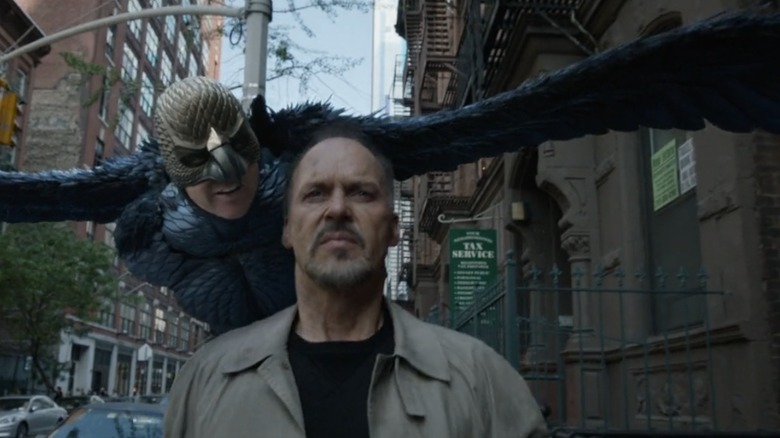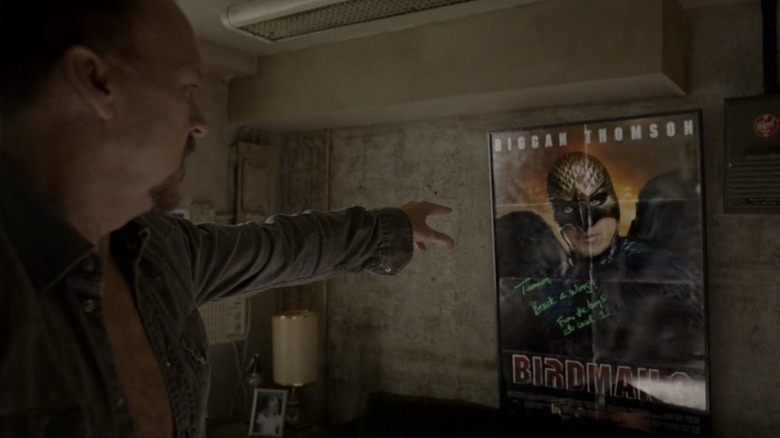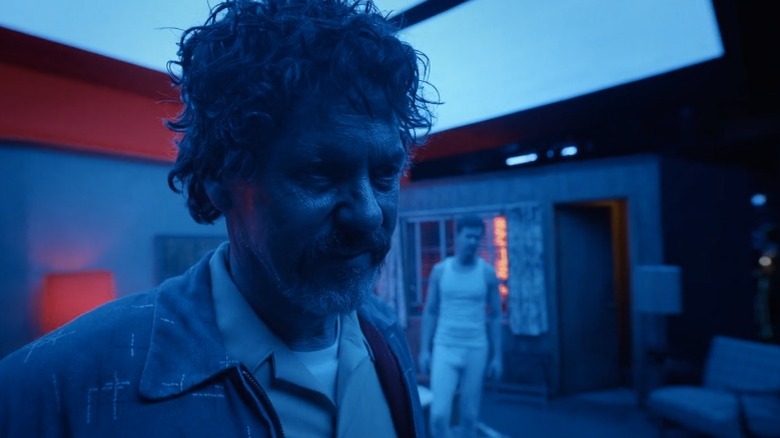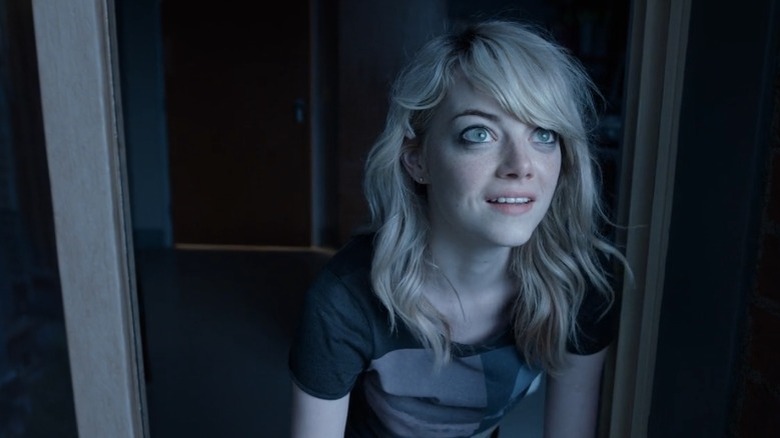Birdman Ending Explained: Soaring Away
Following its big win for Best Picture at the Oscars, Alejandro González Iñáritu's "Birdman" (and/or its optional parenthetical "The Unexpected Virtue of Ignorance") was sort of a short-lived memory for many in the cinephile community despite having a star-studded cast (Michael Keaton, Emma Stone, Edward Norton, Amy Ryan, Naomi Watts, Zach Galifianakis, etc.). But looking back years later, "Birdman" is a movie that has a lot to say about the way we perceive actors, their careers, and the roles they become famous for.
Riggan Thomson (Michael Keaton in a major "comeback" role) is an aging actor who is looking to reclaim himself as a serious artist, particularly in the theater, even as his longtime role as onscreen superhero Birdman constantly beckons him back to Hollywood fame and fortune. He is currently directing a stage production of Raymond Carver's "What We Talk About When We Talk About Love," a personal passion-project. But instead of getting asked about the play, he keeps receiving rumor-mill questions by pop-culture press about sensationalist tweets and possibilities of a "Birdman 4".
The Plights of An Actor
In the finale of the movie, as the pressure of his imposter-syndrome comes to a head, Riggan hears his Birdman ego say to him "let's end this on our own terms, with a grand gesture." So he decides to die by suicide on stage for his play. But his self-inflicted gunshot does not prove fatal, damaging his nose. After surgery, Riggan has a vision of Birdman in the hospital bathroom. He then goes towards a window and stands on its ledge, attracted by the sounds the birds are making outside. The last moment is a shot of his daughter Sam (Emma Stone) frantically looking to see if her father has fallen down from the window ... but instead, she looks up and smiles, indicating, perhaps, that he is flying.
This ambiguous moment suggests both death and transcendence and it is significant that his daughter is the last character we see. Riggan's relationship with Sam is represented as contentious not only in their inability to connect as family, but in their disparate understandings of culture and Riggan's relevance within it. As Riggan considers his play a chance to "do something that actually means something," Sam retorts back "Means something for who? Dad, you had a career before people started to forget who was inside that bird costume." Riggan's identity as an actor became lost in the character he was playing and thus, the art of his acting became swallowed by the commercial profit of a Hollywood IP icon.
To Be Taken Seriously
Director Alejandro González Iñáritu uses a blend of reality and escapism in "Birdman" as a metaphor to illustrate this blurred conflict within Riggan. Riggan is pressured by his Birdman alter-ego on several occasions to drop his theater career and regain the glory of his franchise role. "You save people from their boring, miserable lives," Birdman says in a gruff baritone voice akin to Christian Bale's Batman character. After Riggan watches an interview with Robert Downey Jr. about the upcoming "Avengers" movie, Birdman's voice grunts in his head "That clown doesn't have half your talent, and he's making a fortune in that Tin Man getup. We were the real thing Riggan."
The turmoil within Riggan is further exemplified by the film's technical choices, namely Iñáritu and director of photography Emmanuel Lubezki's decision to film "Birdman" in what seems like a continuous single shot. Days, nights, and events seem to meld together, as do Riggan's identity as an actor and superhero icon. Riggan tries desperately to separate himself from his past. Birdman refers to Riggan as "we" and Riggan explodes "There is no we! I am not [expletive] you!" Iñáritu keeps Michael Keaton front and center in each shot for most of the movie, and it's not a coincidence that Keaton, an '80s star whose most iconic roles were both franchise blockbusters like "Beetlejuice" and "Batman," would find commonalities with Riggan.
Learning to Fly
So, back to that ending. Does the inference of Riggan flying with the bird suggest a metaphor for transcending his legacy as Birdman, or an acceptance of it? The reaction of Sam smiling suggests a little bit of both. As she says to her father after showing him an embarrassing viral video of him running through the NYC streets with nothing but his underwear: "350,000 views in less than an hour. Believe it or not, this is power." Sam's understanding of popularity, fame, and relevance in the internet age is in conflict with Riggan's need to be accepted as a serious artist. Riggan wants to be rid of his Birdman alter-ego, but it's forever a part of his career. It's what people know him for.
Riggan flies one other time in the movie, and it's after speaking with the harsh theater critic Tabitha Dickinson (Lindsey Duncan), who tells him she's going to write a scathing review of his play before even seeing it because she hates everything he and his portrayal of Birdman stand for. Contrarily, while he's recovering in the hospital, Sam sets up a twitter page for Riggan and tells him "you got 80,000 followers in less than a day." Perhaps in the end, Riggan understands the power of his mainstream identity as Birdman will always be a part of him but while still not fully defining him as an artist. He soars knowing that he can be both Birdman and Riggan Thomson and that ridding himself of one would be ridding himself of both.



